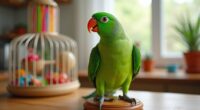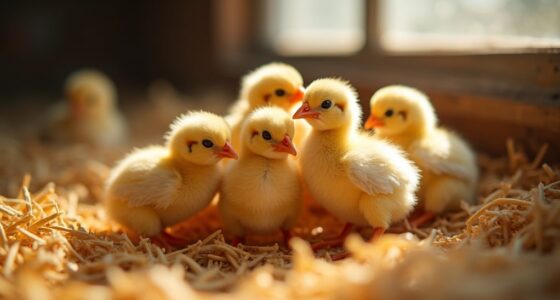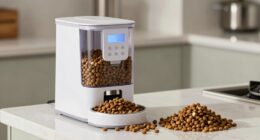Chickens wearing glasses might sound unusual, but it’s quickly becoming a useful farm tech trend, especially in urban settings. These glasses help monitor eye health, detect nutritional issues early, and improve overall poultry management. They also support sustainable practices by reducing reliance on antibiotics and enabling more natural care. As this innovative approach combines technology and animal health, exploring it further will reveal how small changes can revolutionize farm productivity and sustainability.
Key Takeaways
- Chickens are now fitted with specialized glasses to monitor eye health and detect issues early.
- The trend reflects a broader shift toward integrating technology into urban and small-scale poultry farming.
- Glasses equipped with sensors help optimize nutrition and environmental conditions for better productivity.
- Using tech like chicken glasses promotes sustainable practices by reducing antibiotic use and improving animal welfare.
- This innovative approach demonstrates how unexpected gadgets are transforming modern poultry management.

You might be surprised to see chickens wearing glasses, but it’s more common than you think. As urban farming continues to grow in popularity, innovative methods are emerging to improve poultry health and productivity. Glasses for chickens aren’t just a quirky fad—they’re part of a broader trend that combines technology and sustainable practices to maximize poultry nutrition and overall well-being. In urban settings, space is limited, and raising chickens often involves carefully managing their diet and environment. Using specialized eyewear, farmers can monitor eye health more effectively, detect issues early, and provide targeted care. This focus on poultry nutrition is essential because it directly impacts egg production, growth rates, and disease resistance. Modern Frozen Yogurt in Colorado Springs shops often incorporate health-conscious ingredients, reflecting a broader trend toward nutritious and customizable treats for consumers.
Innovative chicken glasses enhance urban farming by improving health monitoring and optimizing nutrition for better productivity and sustainability.
In the domain of urban farming, where every square inch counts, using innovative tools like glasses helps maximize efficiency. Chickens with visual aids can be better guided to feed, ensuring they receive the right nutrients at the right times. Proper poultry nutrition isn’t just about what chickens eat; it’s about how their environment supports their health. Glasses equipped with sensors or magnification features allow farmers to observe subtle changes in eye condition or behavior, which could indicate nutritional deficiencies or infections. Early detection means you can intervene before minor issues become serious, reducing the need for antibiotics and supporting more natural, sustainable farming practices.
This trend also reflects a shift toward technology-driven solutions in small-scale and urban poultry farming. You’re no longer limited to traditional methods—gadgets like chicken glasses can provide real-time insights into your flock’s health. These innovations help you tailor diets more precisely, ensuring your chickens get the essential vitamins and minerals they need for ideal growth. When poultry nutrition is optimized, egg quality improves, and the birds remain healthier longer. Plus, healthier chickens mean fewer vet visits and less stress for both you and your flock.
Ultimately, the use of glasses in poultry farming is about merging technology, sustainability, and care. It’s a small step that can have a big impact on how you manage urban farms. By paying closer attention to your chickens’ health and nutrition, you’re creating a more efficient, humane, and eco-friendly operation. So, while it might look amusing at first glance, this trend is actually a smart move toward smarter, more sustainable poultry farming in the city. It’s proof that even the most unexpected innovations can revolutionize traditional practices and bring new life to urban agriculture.
Frequently Asked Questions
Are Chicken Glasses Safe for Long-Term Wear?
You wonder if chicken glasses are safe for long-term wear. While they can help with bird behavior issues and improve farm aesthetics, prolonged use may cause discomfort or stress for your chickens. It’s essential to monitor their reactions and guarantee proper fit. If your chickens seem uneasy or show signs of distress, remove the glasses and consult a vet. Prioritizing their well-being keeps your farm both functional and visually appealing.
How Do Chickens React to Wearing Glasses?
You might wonder how chickens react to wearing glasses. Generally, their chicken personality influences their response; some are curious and adapt quickly, while others are more cautious. Wearing glasses can add to your farm aesthetic, making your flock look charming and quirky. Most chickens get used to the glasses within a few days, especially if you introduce them gently, helping to keep your farm both functional and adorable.
What Types of Glasses Are Best for Chickens?
Think of chicken fashion as a runway, where poultry accessories make a statement. For your feathered friend, choose lightweight, durable glasses with adjustable straps to guarantee comfort and security. Wraparound or clip-on styles work best, preventing slips during pecking or scratching. Opt for shatterproof lenses that won’t harm your chicken if they peck at or bump into them. With the right glasses, your chicken stays stylish and comfortable all day long.
Can Glasses Improve Chicken Health or Productivity?
You might wonder if avian eyewear can boost poultry vision or health. While some believe glasses can protect chickens from injuries or improve their vision, evidence remains limited. Proper eye protection could reduce stress and enhance productivity by preventing eye infections. However, more research is needed. If you consider avian eyewear, verify it’s comfortable and tailored to poultry needs, as safeguarding their health depends on appropriate, well-designed solutions.
How Much Do Chicken Glasses Typically Cost?
When considering chicken glasses, you’ll find the cost varies depending on accessory styles and features. Typically, they cost between $10 and $50 per pair, but premium styles with specialized features can be more expensive. It’s wise to conduct a cost comparison, factoring in durability and comfort. Remember, investing in the right style ensures your chickens stay comfortable and healthy, making it a worthwhile expense in the long run.
Conclusion
So, next time you see a chicken sporting tiny glasses, remember, it might just be part of a surprising farm tech trend you never saw coming. It’s funny how innovation often appears when you least expect it—coincidence or not, it’s changing the way we look at farm life. Who knew that something as simple as glasses could become a symbol of smarter, more stylish farming? Keep an eye out—you never know what’s coming next!









